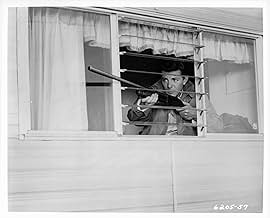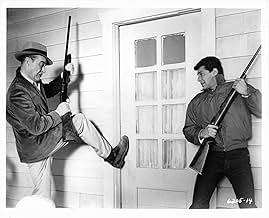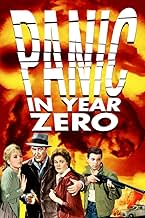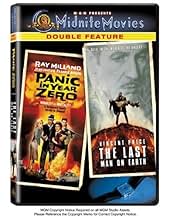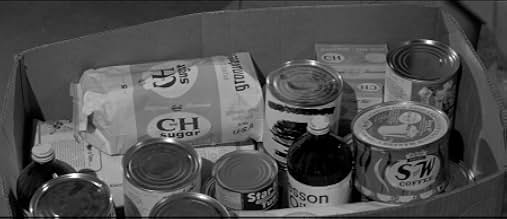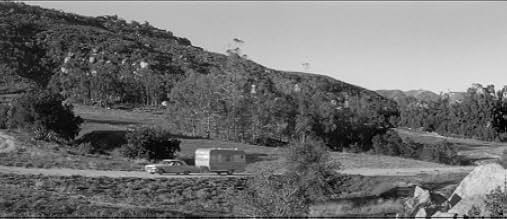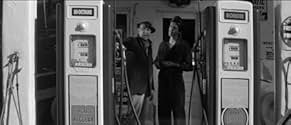IMDb-BEWERTUNG
6,6/10
5295
IHRE BEWERTUNG
Eine Familie verlässt L.A. für einen Campingausflug - kurz bevor eine Atombombe die Stadt zerstört. Während die Stadt im Chaos versinkt, muss der Vater um das Überleben seiner Familie kämpfe... Alles lesenEine Familie verlässt L.A. für einen Campingausflug - kurz bevor eine Atombombe die Stadt zerstört. Während die Stadt im Chaos versinkt, muss der Vater um das Überleben seiner Familie kämpfen.Eine Familie verlässt L.A. für einen Campingausflug - kurz bevor eine Atombombe die Stadt zerstört. Während die Stadt im Chaos versinkt, muss der Vater um das Überleben seiner Familie kämpfen.
Neil Burstyn
- Andy
- (as Neil Nephew)
Chet Brandenburg
- Roadside Diner Customer
- (Nicht genannt)
Ralph Clanton
- Radio Announcer
- (Synchronisation)
- (Nicht genannt)
Kelton Crawford
- Looter
- (Nicht genannt)
Empfohlene Bewertungen
Ray Milland directs and stars in this gritty, cold war tale of a family trying to survive in the mountains after a nuclear war. Milland emphasises an 'everyone for themselves' survival ethic as his character struggles to keep his family alive at the expense of anyone who stands in his way. The movie was a low-budget project, so don't expect to see vistas of destroyed cities (you see one distant mushroom cloud) or any massive military presence (you see one jeep), but despite the cost-cutting "Panic in the Year Zero" is an effective early entry into the post-apocalyptic genre. Although mostly bloodless (a person shot at close range with a shotgun just hugs himself and topples over), the film is quite adult, with several cold-blood killings (on and off screen) and rapes (all off screen). The jazz music score, which is dated and excessive at times, detracts from the bleak tone of the movie, and the ending, while likely 'realistic', may not be a good match for some modern viewers' worldviews. Worth watching, even if only as only a celluloid relic of the cold-war.
One's expectations for an early-60s B movie from American International Pictures are never very high. But this movie was a surprisingly well thought out & thought-provoking story.
Just as a family has left LA for a vacation in the woods, the US suffers a massive nuclear attack on all its major cities from, uh, an unnamed enemy. (Wink wink...) But you won't find any marauding mutants here. In fact this film isn't about nuclear war per se. It really wants to explore the nature of civilized society. The father, well portrayed by Ray Milland, is grimly determined to protect his family at all costs for as long as it takes for order & civil authority to be restored, which he's sure will be a long time coming.
The father is a good man, but a little paranoid & controlling. This probably wouldn't be noticeable in normal times, but now they're in a panicked rush to escape the LA metro area & gather enough supplies to last for months in the wilderness - ahead of all the other people who are starting to clog up the freeways & empty out the grocery stores along the escape route. The contradiction between following the rules & protecting your loved ones in desperate times is very effectively illustrated as he makes some reckless decisions along the way.
Normally for a low budget 60's film like this, I wouldn't even bother thinking about how it could've been improved. But since it's so good at presenting a major moral dilemma in a realistic way, think of these nits as a sign of respect: Milland's character could use a little more introspection, but of course so could a lot of early 60's dads! (Not that Milland's performance was wooden - it was great. But his character had a very constricted personality.) His wife could use a little more assertiveness. She actually realizes this, and explains that she's still in shock over the attack - but after Sept. 11 a lot of us understand that after a good catharsis we can deal with a lot of trauma that initially would immobilize us. After having a good cry, she could've acted as a better conscience for some of the father's more paranoid acts. Also the daughter's character needed some fleshing out.
But of course this is an early 60's film, and clearly made on a low budget. And given its time & budget it is an amazing gem of a film. Definitely one to seek out!
Just as a family has left LA for a vacation in the woods, the US suffers a massive nuclear attack on all its major cities from, uh, an unnamed enemy. (Wink wink...) But you won't find any marauding mutants here. In fact this film isn't about nuclear war per se. It really wants to explore the nature of civilized society. The father, well portrayed by Ray Milland, is grimly determined to protect his family at all costs for as long as it takes for order & civil authority to be restored, which he's sure will be a long time coming.
The father is a good man, but a little paranoid & controlling. This probably wouldn't be noticeable in normal times, but now they're in a panicked rush to escape the LA metro area & gather enough supplies to last for months in the wilderness - ahead of all the other people who are starting to clog up the freeways & empty out the grocery stores along the escape route. The contradiction between following the rules & protecting your loved ones in desperate times is very effectively illustrated as he makes some reckless decisions along the way.
Normally for a low budget 60's film like this, I wouldn't even bother thinking about how it could've been improved. But since it's so good at presenting a major moral dilemma in a realistic way, think of these nits as a sign of respect: Milland's character could use a little more introspection, but of course so could a lot of early 60's dads! (Not that Milland's performance was wooden - it was great. But his character had a very constricted personality.) His wife could use a little more assertiveness. She actually realizes this, and explains that she's still in shock over the attack - but after Sept. 11 a lot of us understand that after a good catharsis we can deal with a lot of trauma that initially would immobilize us. After having a good cry, she could've acted as a better conscience for some of the father's more paranoid acts. Also the daughter's character needed some fleshing out.
But of course this is an early 60's film, and clearly made on a low budget. And given its time & budget it is an amazing gem of a film. Definitely one to seek out!
A family struggles to survive the anarchy in a world devastated by nuclear war. This is a believable story by the standards of the time it was produced; the possibility of a nuclear winter had not yet been considered. There are no bands of mutants roaming around eating the survivors, just ordinary criminal types. Yes, I'm afraid that circumstances like that do bring such people out of the woodworks. Ray Milland's character makes intelligent, and sometimes hard, decisions to ensure his family's survival.
Shot in nice moody black-and-white CinemaScope, starring Ray Milland, Jean Hagen (a far cry from Lina Lamont here!), and Frankie Avalon getting the chance to do a serious role. Interestingly it was also directed by Ray Milland, and is a fairly accomplished little cinematic parable, again dealing with the threat, and here the after-effects, of atomic warfare.
Milland and his family set off on a weekend camping/fishing trip and a flash in the distance they think at first is lightning turns out to be an atomic mushroom cloud over Los Angeles. The rest of the film they attempt to survive and maintain some resemblance of civilized behavior while rationalizing their lapses into violence against the panic-stricken populace, looters, and opportunists who suddenly appear. It might easily have been handled as the exploitation film promised by the trailer (it's an American International production, after all), but is actually a very thoughtful and well-structured meditation on how people might react in the event of the massive nuclear attack everyone was fearing at the time.
Milland and his family set off on a weekend camping/fishing trip and a flash in the distance they think at first is lightning turns out to be an atomic mushroom cloud over Los Angeles. The rest of the film they attempt to survive and maintain some resemblance of civilized behavior while rationalizing their lapses into violence against the panic-stricken populace, looters, and opportunists who suddenly appear. It might easily have been handled as the exploitation film promised by the trailer (it's an American International production, after all), but is actually a very thoughtful and well-structured meditation on how people might react in the event of the massive nuclear attack everyone was fearing at the time.
Los Angeles family vacation is interrupted by nuclear war. Now they must escape into the mountains to avoid the radiation, the panic, and the rapists.
Despite the insipid nuclear holocaust effects (looks more like a thunderstorm), this is a surprisingly effective movie. Milland elicits effective performances from each and every member of his cast (Frankie Avalon has never been better). The menace, humiliation and sheer terror of rape has never been more poignantly depicted on the screen, and all without nudity. A minor classic.
Despite the insipid nuclear holocaust effects (looks more like a thunderstorm), this is a surprisingly effective movie. Milland elicits effective performances from each and every member of his cast (Frankie Avalon has never been better). The menace, humiliation and sheer terror of rape has never been more poignantly depicted on the screen, and all without nudity. A minor classic.
Wusstest du schon
- WissenswertesWhen the family is in the car at the beginning of the film and suspect something is happening, they cannot pick up any "CONELRAD" stations on the car's radio. CONELRAD (COntrol of ELectromagnetic RAdiation), established in 1951, was the first nationwide system for emergency broadcasts in the United States. All radios made between 1953 and 1963 were required to have marks on the AM dial at 640 and 1240 MHz where citizens were expected to tune to obtain civil defense information. CONELRAD was succeeded by the Emergency Broadcast System in 1963 (which did not use dedicated frequencies) and it, in turn, was replaced by the Emergency Alert System in 1997.
- PatzerIn the scene where the bridge is pulled down, to the left you can see bushes and the bridge pilings being pulled quickly in the opposite direction.
- Zitate
Dr. Powell Strong: Now, you stay on the back roads. And you keep your gun handy. Our country is still full of thieving, murdering... "patriots."
- Crazy CreditsOther than the title, all credits are at the end of the movie.
- VerbindungenFeatured in Aweful Movies with Deadly Earnest: Panic in the Year Zero (1969)
Top-Auswahl
Melde dich zum Bewerten an und greife auf die Watchlist für personalisierte Empfehlungen zu.
- How long is Panic in Year Zero!?Powered by Alexa
Details
- Erscheinungsdatum
- Herkunftsland
- Sprache
- Auch bekannt als
- ¿Habrá otro mañana?
- Drehorte
- Produktionsfirma
- Weitere beteiligte Unternehmen bei IMDbPro anzeigen
Box Office
- Budget
- 225.000 $ (geschätzt)
- Laufzeit
- 1 Std. 33 Min.(93 min)
- Farbe
- Sound-Mix
- Seitenverhältnis
- 2.35 : 1
Zu dieser Seite beitragen
Bearbeitung vorschlagen oder fehlenden Inhalt hinzufügen


